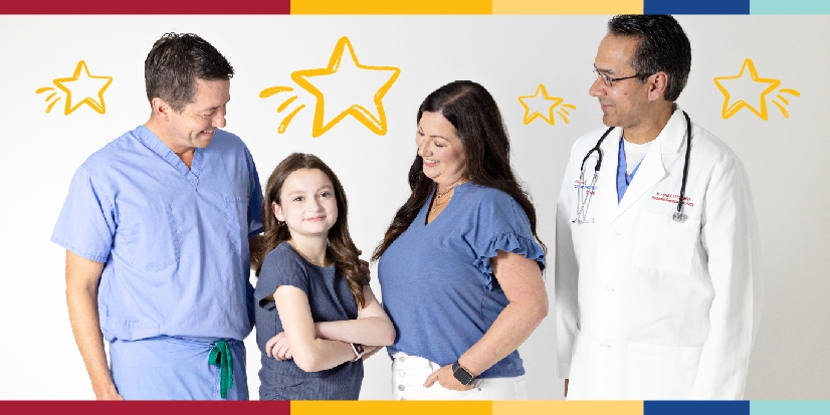Clinical Trial Patient Looks Toward Future After Brain Cancer Treatment
- Category: News, Adults Services
- Posted On:
When Claudia Cavallin was diagnosed with a brain tumor three years ago, the Stephenson Cancer Center at OU Health not only provided lifesaving surgery and clinical trial treatment, but it became a home away from home.
Cavallin is a doctoral student at the University of Oklahoma in Norman, where she, her husband and two children moved in 2015 from their native Venezuela. Cavallin was excited about the move and for her family to learn a new language and culture. But she also was having constant headaches.
“Good things were happening – I love OU and was making friends, but my headaches were still happening,” she said. “I thought maybe they were because of the weather – we don’t have winter in Venezuela – or because I was so busy and needed to rest.”
One evening when she came home after class, Cavallin had a seizure, an event she doesn’t remember. Her family called 911 and the search for a cause began. After an MRI revealed the tumor, she was referred to Stephenson Cancer Center.
Brain tumors have four grades, with grade four being the most aggressive type of cancer. Cavallin was diagnosed with a grade II glioma. It was located in the area of her brain where language and memory functions take place. She told her treatment team how important it was for her to retain all the abilities necessary for her work – reading, teaching, speaking different languages and translating. They opted for awake brain surgery, during which Cavallin interacted with the surgical team. They asked her questions about language, colors and mathematics to ensure her brain function was intact – all while the surgeon was removing the tumor.
“Our surgeons could always go in and remove a bigger area of the brain around the tumor, but it would cause patients lots of problems,” said James D. Battiste, M.D., Ph.D., director of the Comprehensive Brain Tumor Program at Stephenson Cancer Center. “Because a big part of her career involves speaking and language, we wanted to preserve that functioning. In brain tumors, that’s always the trade-off. We want to treat the patients as aggressively as possible, but we also don’t want to take too much brain because then they couldn’t function. What good is it if you’re cured but not functioning?”
Since her successful surgery, Battiste has led Cavallin’s treatment, which involved radiation and chemotherapy. She opted to go on a National Cancer Institute-sponsored clinical trial that compares two different protocols for effectiveness and amount of complications and side effects. One protocol involved radiation plus a cocktail of three drugs that have been around longer but are harsh for the patient’s bone marrow and are partly given through an IV. The other protocol involved radiation plus a newer drug that is less harmful to bone marrow and can be given in pill form. The clinical trial, which is being conducted across the nation, is still ongoing.
Cavallin endured her radiation and chemotherapy well, with manageable side effects. She returns to Stephenson Cancer Center every four months for an MRI. Her checkups are like reuniting with family – the physicians, nurses and staff who have answered every question, reassured her and her family, and played her favorite music while she was in the MRI machine. Cavallin said she intentionally arrives at her appointments a little early, for a sentimental reason.
“Sometimes I miss my family because I left them in Venezuela, and it’s not such a good situation there right now,” she said. “But my father plays the piano, and in the lobby of the cancer center, there is a piano playing all the time. And it plays many of the same songs my dad used to play for me, so it helps me make a connection to him. I like to wait for my appointment because I can drink a coffee and listen to the piano. It’s not a sad place where you think about sad things. I’m going to a beautiful place where I have friends. That’s another kind of medicine for me.”
Cavallin also has resumed her busy schedule. She is working toward her doctorate in the Department of Modern Languages Literatures and Linguistics. She also works as a graduate teaching assistant and writes for Latin American Literature Today, an affiliate of OU’s renowned World Literature Today publication. In the future, she plans to teach.
She also calls herself a cancer survivor. As a clinical trial participant, she not only received cutting-edge treatment, but she contributed to research that will improve the lives of other patients for years to come.
“Patients like Claudia are the heroes,” Battiste said. “They’re the ones who have so much courage.”


.png)
